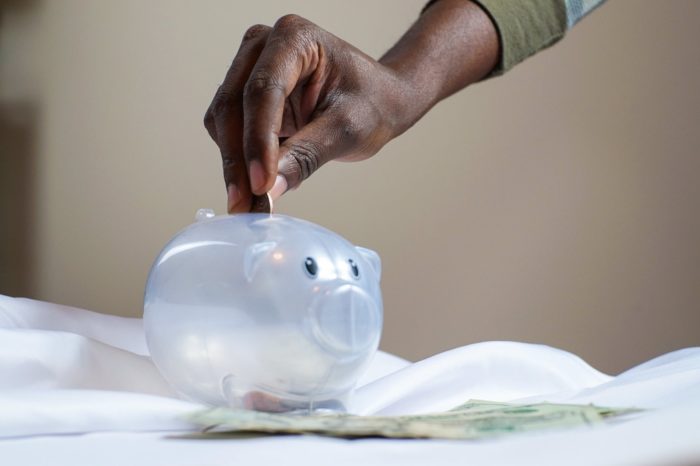
Is it better to save or invest your money? Saving and investing are two different methods of growing wealth that share similar characteristics. Both have their pros and cons. We’ll talk about how to build wealth with either option.
What’s the Difference Between Saving and Investing?
The difference between the two is straightforward. Saving money means storing your dollars in a safe place like a savings account at a bank. You can quickly withdraw your money for emergency use. Usually, a standard savings account or a high-yield savings account will earn you interest over time.
Investing is where you grow your wealth in the stock market, an ETF, cryptocurrency, or real estate, hoping for a high return over a short or long period. The invested money is usually for retirement or other long-term financial goals.
So, what are the pros and cons of each?
Pros of Saving
- Easy to liquidate or withdraw your money in an emergency
- Best for short-term saving goals (vacation, a new car, etc.)
- Money is FDIC insured
- Easy to deposit
- Useful for down payments
- Earns you interest
Cons of Saving
- Longer withdrawal times for online banking (1-3 business days)
- Earned interest can be low
- The value of your dollars is guaranteed to decrease as inflation rises. For example, $10,000 saved in 2001 would be worth $6,415 in 2021 (assuming 2.5-3% inflation)
Pros of Investing
- Potential of high returns
- Best for long-term goals (retirement, a mortgage on a home, etc.)
- Source of passive income
- Effective vehicle to beat inflation. For example, $10,000 invested in 2001 could be worth $67,275 (assuming 10% return)
Cons of Investing
- Potentially high volatility & risk (you could lose your money due to loss in value)
- Higher taxes for early investment withdrawals from retirement accounts
- Time-consuming research involved in finding the best investment option
- Not as liquid as cash in a savings account (e.g. for an emergency)
Which Is Better?
Saving and investing are both important so it’s safe to say that neither is better. While investing your money will be the best way to grow your wealth at a higher return, it’s wise to have money set aside for emergencies and as a hedge against risk.
Why? Consider what could happen if you invested all of your money rather than setting some aside for an emergency. For example, what if you needed surgery or a new car for work because your old one died? You would either need to wait for the next couple of pay periods from your job to cover the expenses, use a credit card resulting in high-interest debt, or you would need to withdraw your invested money.
The problem with pulling funds from your investments is that it can take several days before you actually get your hands on that cash or you can incur fee penalties for early withdrawals (from retirement accounts) setting back your plans for when you want to retire or buy that dream home of yours. Generally, the longer you allow your investments to sit, the greater the return.
Having money in a savings account can bring you peace of mind since you will be financially prepared in case of an emergency. For this reason it’s generally recommended that you save an emergency fund prior to getting into investing.
How Much Should I Save?
How much you should save will depend on several factors:
- Your living expenses (how much do you spend each week or month?)
- How stable your job/income is
- How difficult/long it would be to find a new job if you were laid off today
- How many kids you have (if any)
- If you’re married
- Whether you’re attending a college or university
- Your health condition(s)
- Your age (are you getting close to retirement?)
The recommendation is to save enough money for three to six months. However, that could be more, according to your circumstances.
How Much Should I Invest?
Some suggest investing as much as 10-15% of your income. However, a common practice and recommendation is to hold off on investing until you’ve built your emergency fund. Once your emergency fund is fully stocked, any extra capital can be leveraged to grow your wealth. If funds are tight, you can invest as much as your situation permits until you can afford to increase your contributions.
How to Save Money Each Month

Saving for an emergency may be a challenge, especially if you’re already spending most of your money to pay off debts or expenses. While paying off any debt should be a priority (especially high-interest debt such as credit card debt), making small contributions to an emergency fund each month can become a lifesaver in the future. Here are some ways to begin saving more money:
Pay Off High-Interest Debts
It may sound unusual, but paying off your high-interest debts first can help you to save money. For example, if you have $10,000 in credit card debt, with a minimum payment of $500 due each month and an interest rate of 18%, it would take you two years to pay it off, and you would end up paying $1,978 in interest. However, you can save yourself more money by making an effort to pay more than the minimum amount each month. If you paid $600 a month instead, you could save $1,159 in interest, meaning you would only have to pay $819. This extra $1,159 can further expedite paying off your other debts and go toward building your emergency fund. From there, once you’ve paid off your debts and have reached your emergency fund goals, you can start investing.
Set an Emergency Fund Goal and Make Contributions Each Month
Calculate how much you spend each month and multiply it by three to six months to get a rough estimate on what you would need to survive for that time. Only calculate the essentials like groceries, prescriptions, or medicine (if you have a medical condition) and bills like rent and utilities.
Based on the approximate total you get, take a small percentage from your paycheck each month and deposit it into a savings account until you reach that goal. The amount is up to you. For example, 5-10% could be your starting point.
Of course, you can always increase the goal amount and your contributions as your circumstances permit. For example, once you have paid your debts, you may choose to contribute more to your emergency fund.
Eliminate Nonessential Expenditures
Consider eliminating some nonessential expenses and deposit the extra money into a savings account or investing it. Alternatively, you could use it to help pay off your debts more quickly. Think about what you don’t need and cut back or eliminate it from your expense list (do you really NEED that guac on your chipotle burrito?).
Open a Prize-Linked Savings Account with PrizePool
If you’re looking at how to save more money, a high-yield, prize-linked savings account is another option. The interest you earn is nearly 7.5 times the national average. Though earning interest may feel slow, at PrizePool, we make saving fun and worth it.
In addition to earning a 0.30% bonus on your balance, the money you have deposited with us earns you tickets that are placed into a drawing for cash prizes each week. If you don’t win, you still get to keep your money and let it continue earning your savings bonus. The more you save, the greater your chances are of winning a weekly cash prize. We provide our users an option to be responsible with their money while giving them an entertaining way to grow their wealth! Plus, all deposits are held with our bank partner, Evolve Bank & Trust, Member FDIC.
It’s Up to You!
Many probably find themselves stuck deciding on how to build wealth. Both saving and investing have advantages and disadvantages but are crucial to building a strong financial foundation. Saving is the critical first step and can be used to store wealth. Once you’ve secured an emergency fund that you’re comfortable with, you are now in a position to grow your wealth by investing. Investing should be done after you’ve fully stocked your emergency fund. Any additional dollars in your savings account, on top of your emergency fund, are losing value and could be used to grow your wealth. As a final note, all wealthy people save and invest. So in the end, you will want to do both to secure your financial future and prepare for the unexpected.